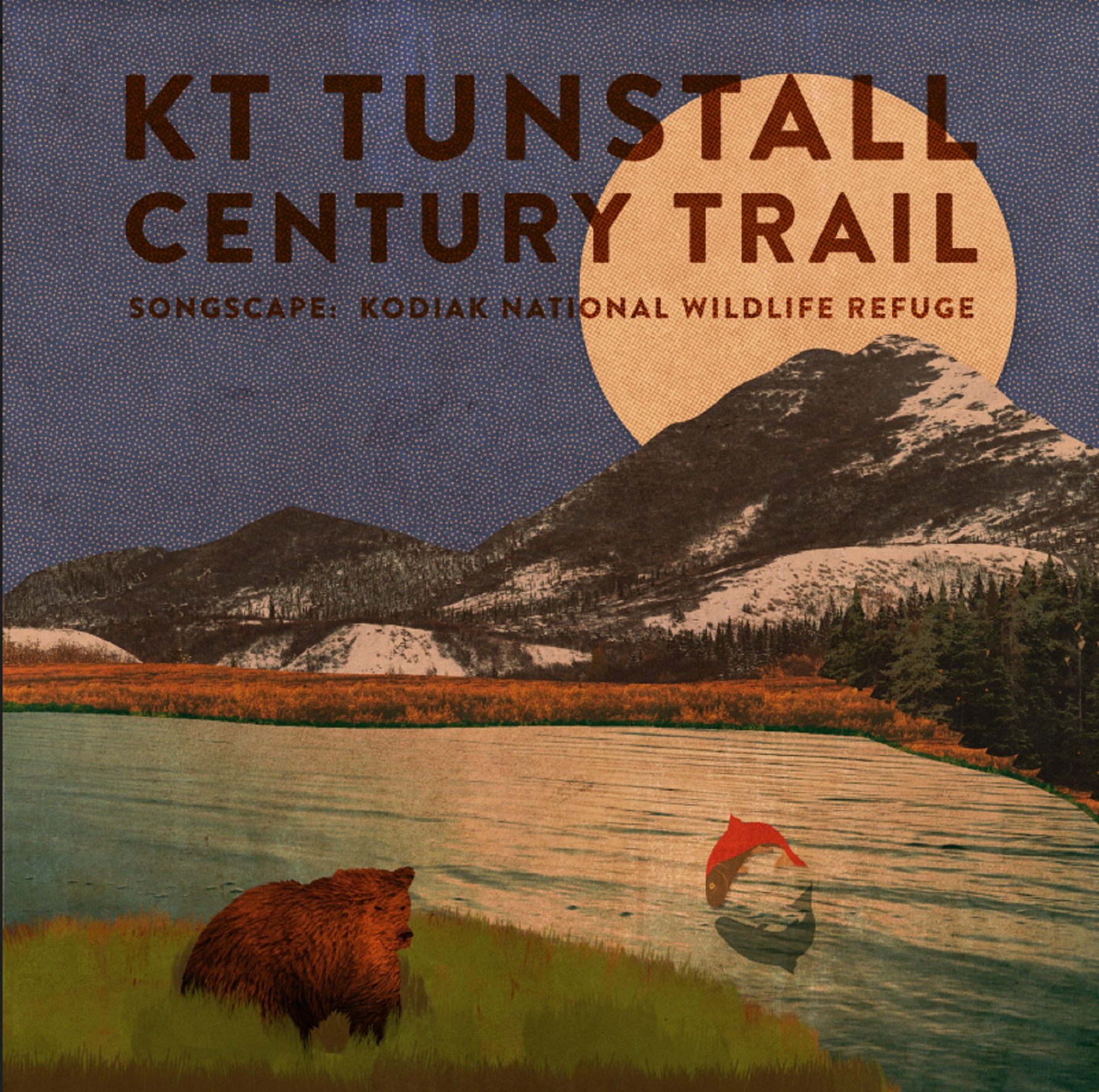With over three thousand brown bears in the Kodiak Archipelago of Alaska, one might wonder why Grammy-nominated singer-songwriter KT Tunstall would choose Kodiak National Wildlife Refuge as a place to craft a new song. However, Tunstall thrived in the environment, captivated by a once in a lifetime opportunity to watch bears catch salmon out of the window of an off-grid cabin in the heart of the federal refuge. Her new single, “Century Trail”, was inspired by a week of adventure and beautifully documented by outdoor videographer Chris Shane in an accompanying music video. Both
The songwriting retreat was part of nonprofit Sustain Music and Nature’s Songscape program. Songscapes bring musicians to public lands across the United States to create new music inspired by our national treasures. The program brings awareness to America’s vast system of parks, refuges, rivers, forests, and rangelands that require continued public support in order to thrive. This Songscape was a complex partnership between Sustain Music and Nature, the US Fish & Wildlife Service, Primary Wave Music, and Koniag, Inc, the regional Alaska Native Corporation that represents more than 4,400 Alutiiq shareholders.
“Century Trail” reflects the incredible beauty KT Tunstall experienced at Kodiak National Wildlife Refuge this past October. The retreat began with a float plane ride from the fishing city of Kodiak over to Camp Island on Karluk Lake. At more than 11 miles long, Karluk Lake is Kodiak Island’s largest lake and is home to abundant salmon runs, legendary Kodiak brown bears, and rich cultural history. Camp Island, the site of a former fish research lab, is shared with Koniag’s Kodiak Brown Bear Center. The old lab, while cozy, had KT Tunstall composing bear-related songs on the fly. Walking to the docks, outhouse, or over to the luxurious Brown Bear Center required walking through trails lined with thick vegetation. With bears often using the same paths as humans, making noise and singing silly songs was a vital way to avoid a too close for comfort bear encounter.
Tunstall was immersed in nature and surrounded by wildlife the entire week. She fished for Dolly Varden char, kayaked, snorkeled with spawning sockeye salmon, and encountered more than a dozen Kodiak brown bears, including a curious bear that seemed to spend a few moments listening as she played guitar outdoors in a cottonwood tree.
Tunstall drew inspiration for the title and chorus of the song from the refuge’s famed century trails that are imprinted into the ridges of Kodiak. Formed by hundreds of years of bear paws stepping in the same place, the trails are a magical record of generations of bears. Tunstall shares, “I’ve never been anywhere like it. It’s an incredibly powerful and affecting landscape, full of ancient rock and rivers, all teeming with brilliant life. The whole experience has had a deep and lasting effect on me.”
Tunstall also spent time in the community of Kodiak. She met with Alutiiq Museum staff to tour the museum and view archaeological artifacts from the Karluk area, learned about bear ecology and behavior with the Kodiak Refuge bear biologist, toured the refuge research vessel Ursa Major II, and practiced salmon skin sewing and beadwork with Alutiiq artist Kayla McDermott. She visited Kodiak’s Main Elementary School as the last activity of her residency, where she spoke with young students about creating music, played them her award-winning song, “Suddenly I See”, and was taught “The Salmon Song” in return.
“I tried to embrace the complexity of celebrating and protecting this pristine place; not only its natural beauty, but also its Alutiiq people,” says Tunstall. “It’s easy for us to visit and take photos, but this is home to these communities and wildlife. This song is a tribute to the line of history and ancestry, from way back when the bears made their way to Kodiak Island across the ice, all the way to present day.”
KT Tunstall is a long-time advocate of environmental causes, and the Songscape project was a natural fit. She has made efforts to neutralize her own carbon footprint, including donating a percentage of her first album sales towards reforestation in Scotland, working with the Environmental Investigation Agency and Reverb in the Peruvian Amazon jungle to highlight illegal logging, and spending time in the Arctic on the Cape Farewell expedition to highlight climate change issues. In 2011, she was awarded an Honorary Doctorate of Environmental Science from her University, Royal Holloway in London. She is a role model for other musicians looking to harness their influence for the benefit of the environment.
Betsy Mortensen, co-founder of Sustain Music and Nature, explains “Music is uniquely positioned to highlight our public lands. Between the emotional pull of the song, the social capital of musicians and the beauty of these places in the music video, I can’t imagine a more powerful way to remotely connect people to their parks. What else can do that in three minutes?” Proceeds from “Century Trail” will support Sustain Music and Nature and Friends of Alaska National Wildlife Refuges.







